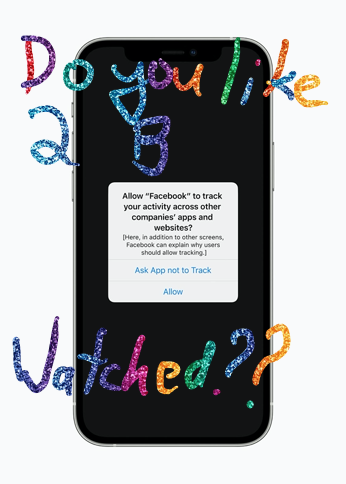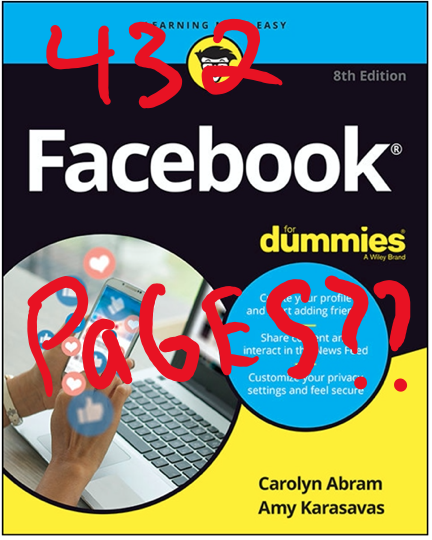Yves here. As someone who 1. hates being spied on (hence my fondness for tech antiques) and 2. has no patience, when I hear Lambert say, for instance, that he had to spend an hour on his new Apple machine (emergency acquisition due to sudden death of one of his workhorse devices) turning off snooping settings, I cringe. And don’t get me started on how creepy it is to have my laptop listen to me, as proven by weird ads that suddenly appear after using words not in my normal conversational repertoire, like “barbed wire”. The idea that there are that many trapdoors to close, plus no doubt others that the NSA can get to, makes me think the only way to have data security is to use pen, paper, and smoke signals.
By Jared Holst, the author at Brands Mean a Lot, a weekly commentary on the ways branding impacts our lives. Each week, he explores contradictions within the way politics, products, and pop-culture are branded for us, offering insight on what’s really being said. You can follow Jared on Twitter @jarholst. Originally published at Brands Mean a Lot
Tracking Feels Bad
Earlier this year, I wrote about how an online ad for a dumb hat threw me into a tailspin. Utilizing information about my online habits, the ad appeared onscreen without my consent, revealing an unpleasant truth about my online habits. Platforms and apps track an all-encompassing set of information about how we use the internet, even when we’re not using them: which sites we visit, how we arrive there, how long we spend doing stuff, which buttons we click, etc.
According to a recent study from Ghostery:
Trackers that collect data on internet users’ online behavior are present on at least 79 percent of websites (unique domains) globally…and 15 percent of all page loads on the internet are monitored by ten or more trackers
The information gleaned from this tracking is the lifeblood of the internet. Mostly, it powers which products and content we see online. Money goes into figuring out how to collect the data, which informs advertising, which sells products. A little money comes in, far more comes out.
Out in the world, the feeling of being followed is a gently rising tension, crescendoing with a hair-raising whisper in the ear. Online, we’re numb to it; even if we’re using our devices to communicate with someone, we’re physically alone, interfacing with the screen. Nonetheless, from our experience in real life, we know being followed is unpleasant. This raises the question, what type of person consents to it, especially from a brand?

Internet Connected Kink
This week, we get closer to finding out: Apple released iOS 14.5, a major software update for all iPad and iPhone devices which includes a tool called ‘App Tracking Transparency’. Via a popup window, the tool alerts users to when an app wants to share user information with a 3rd party. Beginning this week, any app that tracks users has to include the popup in its next software update.
If users say ‘no’, the app has to stop following. Boring. Not titillating.
Saying yes, however, is online exhibitionism for the eyes of brands in its most purified form. In this form of exhibitionism, the rush of exposing yourself arises from revealing your online proclivities for the sake of an onslaught of bespoke advertising. Disrobing for new robing.

This perversion for the benefit of commerce is something the platforms want us to think is ordinary. In their mutually beneficial thinking, you give them data, they show you better stuff to buy. To platforms such as Google, Facebook, and Amazon, in helping them, they’re helping you. Take Facebook’s stance on the issue:
Apple’s latest update threatens the personalized ads that millions of small businesses rely on to find and reach customers.
These platforms reason that you can’t find the stuff you need on your own. They see themselves akin to real estate agents who ask for basic information about budgets and preferences then help find a home for the buyer. What the real estate agent hasn’t done, which apps have, is follow buyers from showings, to the barber, to daycare, to the grocery, and finally to the 7-11 for a quick Slim Jim, all while prodding you to buy a house.
Believing They Want the Best
The aforementioned platforms are unwilling to admit that anyone with basic internet literacy is able to find whatever products or services the platforms are ostensibly helping to surface on their own, without help. If someone can pull up Google, create a Facebook account, or shop on Amazon, it’s safe to assume they’re adept enough to enter terms into a search engine which would direct them to where they need to go. Eg: ‘New tires, Westminster, CO.’

Not only is tapping ‘yes’ the sublimation of exhibitionism into a more socially acceptable capitalist kink, it’s a naive belief that companies like Facebook and Google have our best interests in mind. Apps, alongside 3rd party ad platforms, form an intricate web where information is passed criss-cross amongst one another, all for the purpose of sustaining business models and refining information. To believe it’s crucial that for Google to serve you the best ads for athletic wear, your GoogleMaps usage data must be combined with your search on OkCupid for singles interested in BDSM themed Dungeons and Dragons, misplaces faith in companies notorious for making money off of selling everything you do with an internet connection.
Given how ad platforms use our data, it’s difficult to be optimistic about any change in privacy or user-control. Nevertheless, handing control of how data is shared over to the consumer in such a forthright and obvious manner is a positive step in the right direction. Or, perhaps we’re all far kinkier than we know, and we’ll hand it over in just a matter of time.


These days it is a sign of privilege or sainthood not to own a smartphone, never mind an iPhone.
It’s so inviting to downgrade, but any time you think about how it’d actually work alongside maintaining your existing lifestyle, it seems impossible.
A friend and his 12 year old son and the neighbors 14 year old son went up to our cabin for a few nights a few months ago, and the boys asked if it was true that my wife & I don’t have smartphones, and they asked if we were ‘like stuck in the 1950’s or 60’s?’
We have a perfectly good landline though, leave a message or send me an e-mail.
Imagine how terrorized the lads would’ve been if they found out I never have sent out a text?
Not only have I never owned a smartphone, I’ve never owned any cell phone. I may have sent one text on my wife’s phone, but on the rare occasion I’ve had to send a text using someone else’s phone, I get my kid to do it. And yet I’ve managed to survive just fine. I always planned to get one, but the reason I haven’t is because of the spying.
I do wish they’d rename these handheld devices that everyone else on the planet uses and stop calling them phones, since nobody ever picks up when you try calling them anyway. My wife has been pestering me to get a phone for years so she can get in touch better or something, but she never picks up when I call either, so what’s the point?
My suggestion is ‘the precious’ – everyone who has one seems to latch on to them like Gollum to the Ring.
Answer for Lambert: don’t be lazy. Migrate to GNU+Linux (LinuxMInt for n00bs, otherwise PureOS or Trisquel, or Artix if you are computer literate) for software user freedom. It is really not hard to migrate to GNU/Linux, just find a friend who can help you. It is worth the once-in-a-lifetime inconvenience.
Plus, most normies these days live in the browser anyway, so there’s really little difference if you ditch Windoze or crApple OS.
But with a Smartphone the firmware will getcha. Not sure there is a free-libre smartphone anywhere? Let me know if you know.
> don’t be lazy
I don’t see it as a matter of being lazy or not; I see it as a question of the best use of my time (on this earth, which is limited).
I don’t want to bear the switching costs, which will be a matter of weeks not days.
Further, I have several decades of reflexes in my fingers and hands and mind, none of which work as well on *nix (and I have switched in the past).
Finally, I have several complex workflows, all of which require tools not available on *nix.
Granted, the iOS loons at Apple are trying to crapify MacOS, but I think the MacOS really is so robust they will find that hard to do.
Yes, I have gone back to sending letters written on paper during the pandemic, although I always have done so. It is a good exercise in using hand-eye activity to clear the brain. And paper smells good.
The article is interesting but it doesn’t seem willing to acknowledge how much any expectation of privacy has declined in the U S of A. Culturally, Americans just don’t seem to care. This has had the injurious repercussion, now being noted in some of the posts here at Naked Capitalism, that U.S. politics, especially by “progressives,” is being operated like shopping on-line. Just push a key. When there are no results, do it again. BLM and much of woke liberalism now operate this way–no leaders, no program, no policies, just fill in the field and signal away.
The authorities are only to happy to capture those data.
The underlying story about the hat is worth clicking through–I recently had the odd experience of mentioning a couple of specific, rather unusual objects in an e-mail exchange (you know, on the order of “pistachios” or “one-masted sailboat” or “sandalwood soap”)–and ads, obviously from surveillance of e-mail, turned up.
Hey, how dare you suggest that BLM is little more than a branding exercise!
They helped get rid of Uncle Ben and Aunt Jemima, didn’t they?
Michael Fiorillo: I think that BLM has been only somewhat successful. Let’s assume that its inability to succeed is from over-reliance on amorphous social media. Amorphous social media make fights over branding and “representation” seem like real things.
But we do have to face it: Compared to Occupy Wall Street, BLM loosely organized, most likely too loosely organized.
I like Etsy. But politics isn’t Etsy.
No where to hide.
I exchanged a couple of messages with my friend who lives thousand miles away, in my native language using whatsapp(FB) on my iPhone. It was about dental work.
Soon after, Google delivered an ad from a dentist near me, whose name suggest that he spoke my native language, to my Galaxy tablet running Firefox.
“They” know who I am and where I live.
DJG: If anything, this is an improvement on the expectation of privacy. For decades, it’s been buried in T&C’s that nobody reads. Now it’s at least partially out in the open so that people may decide for themselves.
I think closer attention to the BLM movement would reveal several leaders across a multitude of cities, each with similar, but ultimately distinct, policy pursuits. I’ve witnessed firsthand, from the protests in NYC and Brooklyn, leaders across boroughs and neighborhoods performing boots-on-the-ground change in their respective neighborhoods. This is to say that I only half-agree with you. The BLM movement has massively shifted the Overton window, plus, it’s had a major impact on the current administration’s policy pursuits. If the previous 400 years of this country are any indication, racism won’t be fixed in a couple of summers. It’s easy to look at incremental progress and trash it b/c the participants organize digitally.
Since they do organize digitally, I agree, the authorities are happy to capture that data.
That tool called ‘App Tracking Transparency’ where you have to tap yes or no. This sounds like one of those junk mail filters. Here is what I mean. Scam artists will send out emails promising money or whatever but worded so that it is obviously a scam. Those that reply to that email, however, are now on a sucker list for those scam artists and can then be targeted professionally. The smarter ones have been filtered out here with those emails so maybe that app is the same. If you tap No, then you are more or less OK. But if you tap Yes, then you get put on a sucker list.
Well, the default is that ATT isn’t on, and that as a result no sites have permission to ask to track you in the first place. If you switch it on, it’s because you want, or at least are prepared, to have apps track you. Even then, of course, you have to give individual sites permission.
This made me think of my grandpa, who accepted spam calls from anyone and everyone. All anyone would have to do is spoof this on a browser an god knows what you’d be subjecting yourself to.
Exhibitionism is a good definition for a ‘yes’ to the pop-up. Exhibitionism and lack of privacy is also promoted by other means such as TV reality shows that are, apparently, so popular and create a culture of exhibitionism in the viewers that may transpire in activities other than watching TV. Politics can also be another form of exhibitionism.
There is also an illusion about this and the big data you can gather by tracking millions. In my opinion it might be somehow illusory to believe that you can really have a decent idea on the wants and the needs of the people you are tracking. The case can be made that companies are paying facebook, google and the like too much in the belief they will have better access to consumers. I don’t think of myself as a rare bird and after all these years not me, and nobody in my family, has been driven to buy a single piece of shit or shit service seen on internet ads.
As someone who’s into Kink and Exhibitionism, the idea of selling myself to corporations is fn revolting. Performing for faceless tech companies and algorithms????
That being said, I def clicked on the Link cuz “Kink!” ?⚡?
Taking it to the next level eh, NC!!!! Lol
Thanks for reading, Jonathan! Yves has been kind enough to let me mix it up.
My Pleasure, Jared!
Can’t wait to read ur next article!!!!
So if you tell Facebook ‘No’, where is the assurance that Zuckerberg understands that ‘No means no’ and isn’t just going to keep on tracking anyway?
For Faceborg, Yes means “yeah, bring it on! I wanted it yesterday!”, and no means “ah well, if you insist..”
I’ve never used a cell ‘phone let alone a smart ‘phone, I switched to Linux to get out from under Microsoft’s heel, I use the Brave browser for its ad-blocking and Pi-Hole for DNS with 4,185,789 domains on its Blacklist. I also have a ProtonMail account under an alias for any emailing I have the slightest doubt about having recently abandoned a Gmail account when the daily garbage became too copious to bother deleting.
Any more suggestions for anonymity on the Net gratefully received.
A caution against putting too much faith in going back to smoke signals. . . .
— from “Watch Your Back!” by the inimitable Donald Westlake